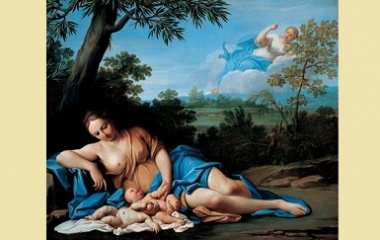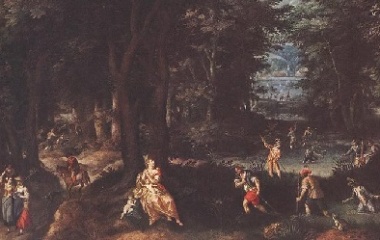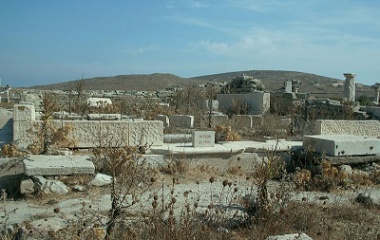Who Is Leto?
In the beginning there was only the primordial being, then the first-born gods came: Heaven (Uranus) and Earth (Gaea). They had 12 children, known as the Titans and the Titanesses. Among the first 12 Titans were Coeus and Phoebe, the parents of Leto, who was born on the Greek island of Kos in the southeastern Aegean Sea.
She was a favorite lover of the Olympian god Zeus. Zeus married his sister Hera during the time Leto was pregnant with the Letoides, twin god and goddess Apollo and Artemis. The two divine children became part of the Olympian pantheon that ruled after the age of the Titans.
Origin
By the time of the marriage of Zeus and Hera, Leto was already pregnant with the Letoides. Despite the fact that the affair predated her marriage, Hera was extremely jealous of the modest and beautiful Titaness. Hera, whose very nature was to create issues for those she didn’t like, managed to push Leto off the heavenly mountain of the gods.
She was left to wander the Earth trying to find a place to stay. Everyone feared offending the powerful goddess Hera and no one would invite Leto in. To make matters worse, Hera sent the dragon Python to chase after her. Zeus intervened to save her, and sent the god of North Wind, Boreus, to carry her out to sea.
It was then she finally came upon a desolate rocky floating island called Delos. The people there allowed her to stay to safely give birth to her twins. Artemis was born first and without too much trouble, but the birth of Apollo lasted for nine days. Hera, still filled with anger and jealousy, kidnapped Eileithyia, the goddess of childbirth, which prevented Leto from having an easy labor before giving birth to her son. Finally, Apollo was born under a palm tree on Delos, surrounded by all of the gods except Hera.
After the birth, the wrath of Hera continued. She sent the giant Tityus to abduct Leto, but the child Apollo was able to slay him with his arrows. As she and the children continued to wander the Earth, they stopped on the Aegean coast in Lycia to drink at a pond. The cruel peasants stirred the mud up to prevent them from drinking. In return for their lack of hospitality, the goddess turned them all into frogs, whose destiny would be tied to the murky waters forever.
Myth of Niobe
Homer’s Iliad tells the tale of the queen of Thebes, Niobe, the wife of Amphion. She bragged about her reproductive abilities and the beauty of her offspring. Niobe had 14 children, seven sons and seven daughters. Leto called upon her twin deities, Apollo and Artemis, to kill all of the children of Niobe, who was left to grieve and weep. Amphion killed himself upon hearing the news. The grieving childless widow begged for mercy from her pain and Zeus turned her into stone. The Weeping Rock stands in Mount Sipylus located in Turkey.
Family of Leto
Coeus and Phoebe were the Titan parents of Leto and her sister Asteria, the goddess of nighttime oracles and falling stars. Coeus was the Greek representation of rationality and intellect, and Phoebe represented prophetic wisdom. Together, they symbolized the knowledge of the worlds.
After Gigantomachy, the fall of the Titans, Zeus began a heavenly chase after Leto’s sister, Asteria. She transformed into a bird to escape him, and took a leap into the sea. Asteria emerged as the island of Delos, where Apollo and Artemis were born.
Her lesser known brother is Lelanto. His name means “unseen”, or one that is not observed. He was the Titan of air and the hunter stalking its prey.
The divine daughter Artemis grew to be the virgin goddess of the hunt. Her twin brother Apollo was a complex deity and important figure in Greek mythology. He was an archer, the god of healing and medicine, light and truth. He also represented music and was often depicted holding a lyre. His sacred place was the island of their birth Delos.
Historical Influence
The Titaness was known for her modesty and kindness. In the Theogony by Hesiod, she is described as “the gentlest in all Olympus”, although we know from the tale of Lycian peasants she turned to frogs, and the wrath she directed at Niobe, that her temper could be short when she was offended.
She also played a role in the Trojan War, fighting alongside Apollo and Artemis. Leto was opposed to the god Hermes on the battlefield; however, he conceded to her and refused to fight her because she was the mother of the children of Zeus.
Most significantly, Leto represented motherhood itself in Greek mythology. Like most mothers, she suffered giving birth to her children and did her very best to raise them. Apollo and Artemis grew up to be members of the powerful Olympian pantheon. It is for her parentage that she is remembered as one of the most famous mothers in mythological history.











thanks this helped me